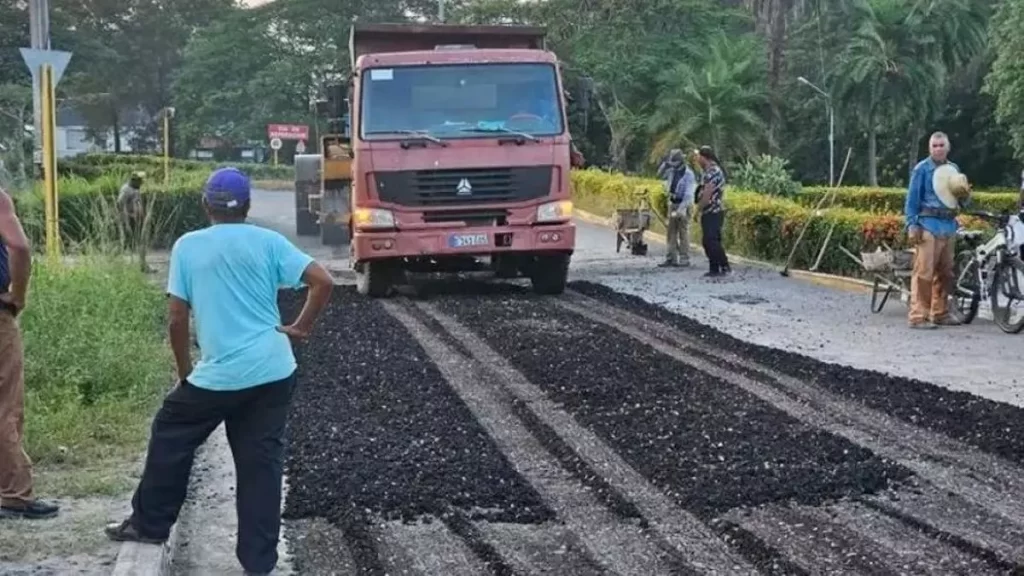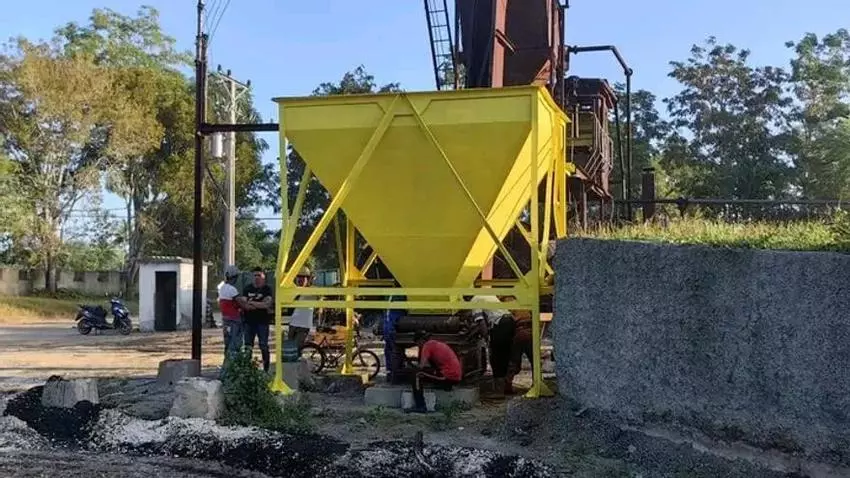
![]() 14ymedio, Havana, 29 March 2024 — Cuba’s state plan to expand the private sector to rescue the convalescent categories of the economy seems to give results in Las Tunas. A brand new MSME (private enterprise) of civil construction has managed to cover “legendary potholes” with its cold asphalt method, in addition to starting up a state tar factory that had been closed for 20 years. Behind the facade of AsfalTunas, however, the State continues to pull the strings.
14ymedio, Havana, 29 March 2024 — Cuba’s state plan to expand the private sector to rescue the convalescent categories of the economy seems to give results in Las Tunas. A brand new MSME (private enterprise) of civil construction has managed to cover “legendary potholes” with its cold asphalt method, in addition to starting up a state tar factory that had been closed for 20 years. Behind the facade of AsfalTunas, however, the State continues to pull the strings.
Founded in mid-2023, in less than a year the company is already able to produce 300 tons of cold asphalt per day, a product that the owner of the company, Yiney Peña Jaime, considers of better quality than the hot asphalt used by the State. “The product made by other plants in the country is the hot asphalt that ages immediately, gets hard when exposed to contact with the sun and is much more aggressive in terms of the emission of gases,” he explains to the official newspaper Periódico 26 in a report published this Thursday.
The AsfalTunas product, on the other hand, “saves fuels and aggregates, in addition to being less harmful to the environment,” says the local newspaper.
As for the state Maintenance and Construction company (Emac), shut down two decades ago for “technological obsolescence, shortage of engines, breakage and the wear and tear of time,” the relationship with the msme and an investment – which the press does not clarify as state or private – has put it back into operation.

The “final touches” to the plant, in addition, will expand its production to more than 5,000 tons of asphalt per month. (Periódico 26)”If we review concrete results, this alliance has been satisfactory. We signed a contract in July 2023, and by the end of last year more than six thousand tons of cold asphalt were produced and executed, which allowed us to solve the road problems in eight municipalities,” Pablo Enrique Paneque Almaguer, director of the State company, told the newspaper. “They had to start from scratch. They began from practically nothing, and now they have a whole structural complex in progress,” he added in reference to the msme.
The “final touches” to the plant, in addition, will expand its production to more than 5,000 tons of asphalt per month, “as long as all the supplies arrive,” clarified Periódico 26. In this sense, however, the private company does not seem to have any problems. The necessary aggregate comes from Las Parras, in the municipality of Puerto Padre, and the pitch (liquid asphalt), from Sancti Spíritus and Matanzas, arrives with the help of the Cuba-Petróleo Union (Cupet).
“Transporting the aggregate depends on the amount of fuel we have, which is often overcome with the help of the government,” explains Pedro Batista Martínez, deputy director of AsfalTunas.
The company managers, who also confess to being “motivated” by a recent visit from the Minister of Transport, Eduardo Rodríguez Dávila, assure that “the support of the authorities has been paramount” in the development of the company. “The machinery we have on the streets is usually rented or leased to other construction companies,” says Batista, adding that the State has offered them “help in terms of the sale of some second-hand equipment, because leases are very expensive and make production more expensive.”
The management of the private business, however, far exceeds that of the state-owned company. “Maintenance and Construction made a million pesos a month when the State was in charge, while we make up to 12 million,” says the owner of the private company.
The management of the private company, however, far exceeds that of the State
According to the newspaper, AsfalTunas “not only assumes the paving of the most critical arteries in the provincial capital, but also carries out social works such as the elimination of intricate and impassable roads.”
“Right now, as a construction company, there is a notable challenge with cement which is the main raw material. If it were not for this relationship, the Emac could not have closed with positive indices last year. We complied with the sales plan, the production values, the main economic indicators of profitability and productivity, and we closed the year with profits,” acknowledges the director of the State company.
Since the Government authorized the creation of private enterprises in 2021, the regime’s alliance with several entrepreneurs, who in many cases serve as frontmen, has been highlighted. This is the case of Miguel Díaz-Canel himself, who maintains a close relationship with shoemakers and the private producers of Camajuaní, in his native Villa Clara. Likewise, the recent investigation for corruption of Alejandro Gil uncovered the alleged business of the former Minister of Economy and Planning with Fernando Javier Albán, owner of the Media Luna, a juice and preserves company in Ciego de Ávila.
Although Periódico 26 insists that “the greatest beneficiary of the task of AsfalTunas is the people,” the regime’s intention to leave part of the Island’s economy in private – but “reliable” – hands is clear. The press, indirectly, admits this. “When there are obsolete State facilities without a rehabilitation plan, the passage into the hands of private individuals (…) can be beneficial both for the company in creation and for the State.”
Translated by Regina Anavy
____________
COLLABORATE WITH OUR WORK: The 14ymedio team is committed to practicing serious journalism that reflects Cuba’s reality in all its depth. Thank you for joining us on this long journey. We invite you to continue supporting us by becoming a member of 14ymedio now. Together we can continue transforming journalism in Cuba.
